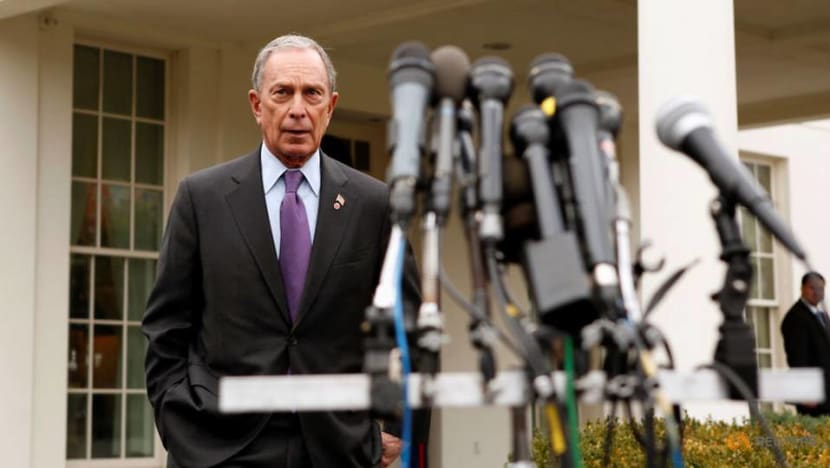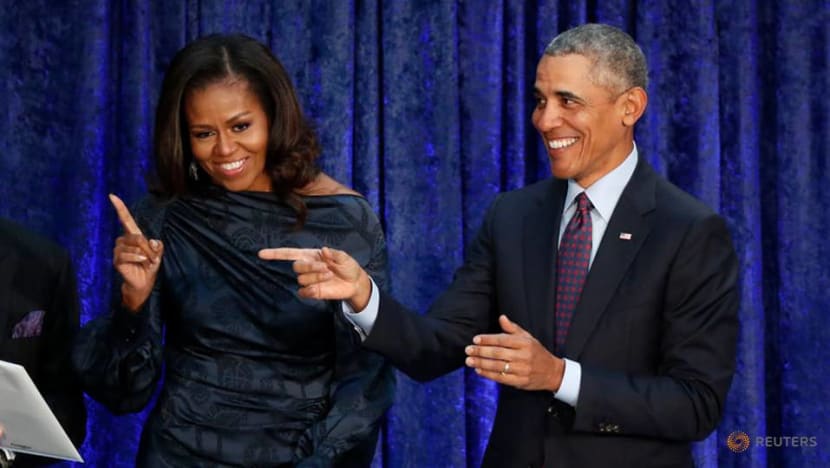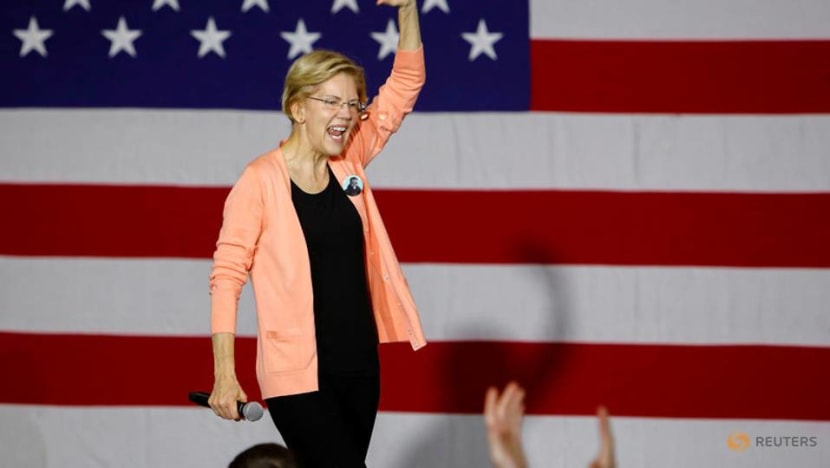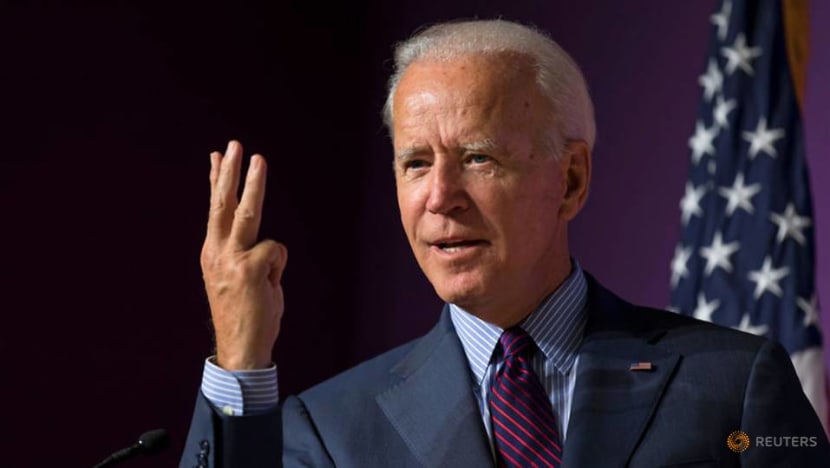commentary Commentary
Commentary: Michael Bloomberg for US President? Only possible in a year like 2020
If Michael Bloomberg does get in the race under this scenario, buckle up for what undoubtedly will be a wild ride, says Steven Okun.

New York Mayor Michael Bloomberg approaches the microphones to speak to reporters after his meeting with U.S. Vice President Joe Biden at the White House in Washington Feb 27, 2013. (File photo: REUTERS/Kevin Lamarque)
SINGAPORE: A year away from the US presidential election, Michael Bloomberg, former Republican Mayor of New York City, prepares to save the Democratic Party by jumping into its primary.
In any ordinary time, he would have no chance at the Democratic nomination.
Bloomberg himself recognised this in March 2019 when he decided not to enter the race.
“I believe I would defeat Donald Trump in a general election,” Bloomberg wrote. “But I am clear-eyed about the difficulty of winning the Democratic nomination in such a crowded field."
But, these are odd times.

ELIZABETH WARREN AND THE ELECTABILITY FACTOR
Right now, the Democratic front runners are former Vice-President Joe Biden and Senator Elizabeth Warren.
The concern is Biden — perceived the stronger of the two versus Trump — falters in the primary and Warren gets the nomination.
Even without Bloomberg, there’s still time for a candidate to emerge showing he or she can win both the nomination and the election.
The last two Democratic Presidents, Barack Obama and Bill Clinton, were respectively third and fourth in the polls leading-up to their primary elections.
2020 can follow the same roadmap of 1992 and 2008 with a candidate outside the top two building support, hitting a stride, taking the Democratic nomination, and ending up in the Oval Office.

But this year, certain influential members of the Democratic party do not want to take that chance.
Electability in the general election looms larger now than at any time in recent history.
Democrat voters don’t need a candidate who best represents them as an individual, they want a candidate who can beat Trump.
READ: Commentary: US House didn't need to pass impeachment process but did. Here's why
READ: Commentary: Trump’s impeachment highly likely but don’t hold breath (yet) for conviction or removal
In a recent Ipsos poll, 34 per cent of Democratic voters said they would support a candidate who they agree with on most issues, but 66 per cent said they would prefer a strong candidate against Donald Trump.
The Biden team hinges much of his campaign on his electability. As Dr Jill Biden, his wife, put it:
[Y]ou have to look at who is going to win this election, and maybe you have to swallow a little bit and say ‘I personally like so-and-so better,’ but your bottom line has to be that we have to beat Trump.
Presumably, Bloomberg’s calculation is that while Biden can beat Trump, the former Vice-President may not be the nominee as his poll numbers fall and Elizabeth Warren’s rise.

There is concern in the party that Warren is not electable as evidenced by recent New York Times polls in which she is behind Trump in key battleground states needed to win the White House.
Bloomberg’s theory is that if Biden cannot beat Warren in the primary, the party will look for an alternative who can win in the general election – and that there is no one else running who can do so.
BLOOMBERG LACKS WIDESPREAD APPEAL WITHIN THE PARTY
Distinct sectors that comprise today’s Democratic party include progressives, moderates, millennials, middle-class white voters, older voters, and African Americans. The candidate who appeals across a multiple of these groups will win the nomination.
No one has yet been able to do that.
READ: Commentary: The mother of all Trumpian battles has just begun
READ: Commentary: US President in 2020 - why Donald Trump could win again
Bloomberg has the same issues in today’s Democratic Party as does Biden, maybe even more so.
The 77-year-old Bloomberg does not appeal to millennials any more than 78-year-old Biden. Last December, I predicted the Democratic nominee will be under the age of 60. I still maintain that prediction.
A billionaire who made his fortune on Wall Street and the financial services sector is not going to appeal to the progressive wing of the party.
And Bloomberg does not have all of Biden’s strengths. Joe Biden has great appeal to the African-American community. The former Mayor of New York has potential problems with black voters given his police department’s use of stop-and-frisk policing, which disproportionately targeted minorities. So, he loses those votes.

Yes, Bloomberg can beat Trump. But how does he get the nomination if Biden cannot?
HE’S TOO LATE IN ANY OTHER YEAR
From 1976 onwards, no one has ever entered a Presidential race this late and received his party’s nomination.
The average campaign began 345 days before the Iowa caucuses.
We are less than three months out.
No one has ever skipped the first four states of the primary contest (Iowa, New Hampshire, South Carolina, and Nevada) and won nationally.
Bloomberg, with his vast fortune and the Democrats unified in their desire to beat Trump, believes he can be the first ever to do so.
Why? If the result of the four early states is a muddle, with three or four candidates each winning one, it becomes a wide-open delegate contest and Bloomberg has the money to go after delegate counts.
Mar 3, 2020 is “Super Tuesday” with primaries or delegate-selection events in Alabama, Arkansas, California, Colorado, Maine, Mississippi, Minnesota, North Carolina, Texas, Tennessee, Virginia, and Vermont.

Then, Michigan a week later on Mar 10, 2020.
And then four more on Mar 17, 2020.
With his positions on climate change and gun control, and his executive experience as a mayor plus his business background, he could be formidable in states like California. This could lead to Bloomberg having more delegates that anyone else by that point.
Mike McCurry, former White House Press Secretary under President Bill Clinton, told me we should start thinking about this scenario as “the Saint Patrick’s Day verdict”, which also happens to fall on Mar 17 each year.
There will be a delegate count then and whoever has the momentum, buzz and conventional wisdom on their side could end-up the nominee.
If Bloomberg can finance a delegate selection machine that runs numbers up in the states holding their caucuses from Mar 3 to 17, he could have a reasonable shot at this.
If this occurs, it will be a Democratic primary like no other. And it will not be pretty.
No doubt early state activists and current candidates will argue the nomination is for those running the full distance, rather than someone who sweeps in at the last minute for the primaries, and the entire marathon ahead would take a toll on Bloomberg.
If Bloomberg does get in the race under this scenario, buckle up for what undoubtedly will be a wild ride.
Steven R Okun regularly provides analysis for CNA on US politics and trade. An official in the Administration of President Bill Clinton, he serves as Senior Advisor for global strategic consultancy McLarty Associates and is in his fourth term as a Governor of the American Chamber of Commerce in Singapore. The views are his own.














